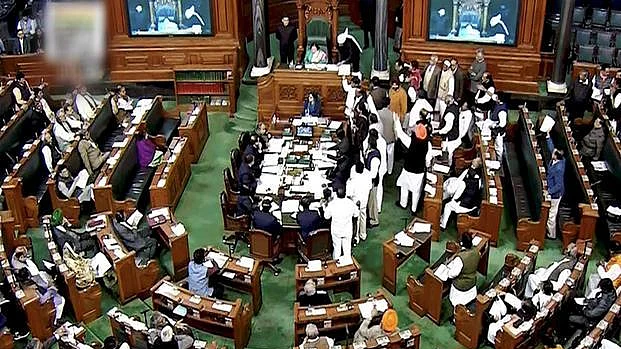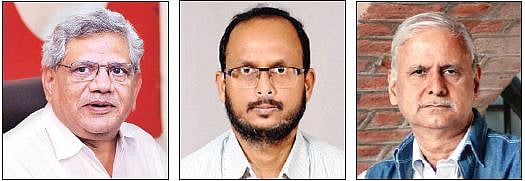Parliament a ‘rubber stamp’ for Modi-Shah
‘Parliament has effectively ceased to exist’, says one of the founders of the Association for Democratic Reforms (ADR)

Parliament is supposed to scrutinise Bills. This chart explains the bulldozing (of) this session. Are we delivering pizzas or passing legislation?
The tweet from Rajya Sabha Member Derek O’Brien put the issue in perspective. He was articulating the growing frustration in the opposition which has accused the Government of taking Parliament for granted. Professor Jagdeep Chhokar, one of the founders of the Association for Democratic Reforms (ADR), goes a step further.
He told National Herald, “The executive has taken over the functioning of the legislature, and the latter has effectively ceased to exist”. Using Parliament as a rubber stamp for the executive, he suggested, defeats the democratic process.
O’Brien also tweeted the following chart to make his point:
So why is the Modi Government in its second avatar in such a tearing hurry to enact laws within weeks of forming the Government? Most political leaders, experts and political observers that NH spoke to were unanimous that the government is using the so-called ‘honeymoon period’, before its popularity begins to wane, to ram through as many laws as possible, some of which have wide-spread ramifications and implications vis-à-vis Constitutional provisions and certain personal freedoms enshrined in the Constitution of India.
The Modi Government in its first term had faced a disenchanted electorate in the last few months of its tenure. Demonetisation, farm distress, faulty GST and joblessness had taken the shine of its rhetoric. Acutely conscious that in its second term it is staring at a floundering economy and job loss, it is trying to get inconvenient amendments out of the way before it gets too late.

While at least some of the amendments seem to be violative of the Constitution and, more specifically Fundamental Rights, and are likely to be put through judicial scrutiny, the lack of legislative scrutiny in the first session of the 17thLok Sabha has sent alarm bells ringing.
***
Speaking to National Herald, former Rajya Sabha MP and CPI (M) politburo member Sitaram Yechury said, “These are very tedious amendments being moved by the government, which must be subject to Parliamentary scrutiny. That normally happens through the Parliamentary Standing Committees. But this government, deliberately or otherwise, has not even constituted these Committees, except for the House Committee, which looks after accommodation for new MPs. This is highly irregular,” he said.
“Normally, the first week of a new Parliament’s session lasts for a week or so. Then the Committees are constituted. Then the business of the Parliament begins. But obviously they are trying to do all this in a hurry to ensure there’s no scrutiny. This is unprecedented,” he added.
“What I find most surprising is that they are not even willing to have the Bills examined by Select Committees, or willing to consider this demand by the Opposition. What the BJP is trying to do amounts to the tyranny of the majority,” he said.
Yechury’s opinion was supported by constitutional expert PDT Achary, Secretary General of Lok Sabha during the tenure of the 14thand 15thLok Sabha.
Speaking to National Herald, Achary said that scrutiny of Bills by Parliamentary Committees was essential since they are normally drafted by government-appointed experts who may not always be able to appreciate the finer points as well as assess all the implications of a new law being enacted by Parliament, which affects the day-to-day lives of 1.25 billion citizens of the country in some way or the other.
“I have personally noticed that Bills sent to the Committees invariably got improved after scrutiny since they went into the nitty-gritty of all the issues involved and the deliberations involved all stake holders – domain experts, academics, members of the civil society, industry as well as government representatives during the proceedings. The reports of these committee are then looked into by the government to enable itself to fine-tune the proposed legislation,” he said.
“Such a scrutiny is obviously not possible in a few hours of a debate on the floor of the House, during the limited time that a Parliament session is on. This process is all the more important in case of amendments being made to important Acts, since these ‘amendments’ may seem minor on the face of it, but actually end up changing the whole meaning of the Acts in question,” he added.
“There was no drastic urgency for the government to pass the Bills in such a tearing hurry; due process should have been followed.” he said with reference to the specific Bills passed by either House of the Parliament in the last few days.
“The Bills could well have been referred to Select Committees if the Standing Committees are not yet in place,” he added.
He explained that most committees are ‘standing’ as their existence is uninterrupted and they are usually reconstituted on an annual basis; some are ‘select’ committees formed for a specific purpose, for instance, to deliberate on a particular bill.
“During my tenure, the Speaker referred most Bills for scrutiny by Parliament Committees,” he pointed out.
Indeed, it’s a matter of record that while the committees during the 14th and 15th Lok Sabha (from 2004 to 2014) scrutinised 60 per cent and 71 per cent Bills respectively, the 16th Lok Sabha from 2014-19 – scrutinised only 26 per cent of the total number of Bills passed in Parliament.
Achary’s former counterpart in the Rajya Sabha, Yogendra Narain, who held the secretary general’s office from 2002-2007, and is the current Chancellor of HN Bahuguna Garhwal University, had a slightly different take on the issue.
Speaking to National Herald, he said that while the role played by Parliamentary Committees in taking up Bills for scrutiny was indeed important, the Opposition failed to play its role effectively, he felt.
“Once they are formed, all the Bills should indeed go to Parliamentary Committees for scrutiny and deliberation, but formation of these 24-odd Committees takes some time,” he said.
“At least in the Rajya Sabha, if the Opposition had got united and insisted on sending the Bills to a Select Committees, they could have put such a motion to vote,” he added. Parties like the TRS, JD(U) and BJD either supported the amendments brought in by the Government or walked out of the House, facilitating the passage of the Bills.
National Herald also reached out to Prof. Jagdeep Chhokar, Founder Trustee of Association for Democratic Reforms for his take on the issue.
“The way their MPs walked out in Rajya Sabha during the debate on the RTI Bill amounted to betraying the cause of the RTI movement. If they had remained present in the House, the Bill would still have sailed through, but at least more votes would have got polled against the motion, which does make a difference. In my personal opinion, political parties don’t have much love for the RTI institution,” he said.
“As far as the issue of hasty passage of Bills is concerned, besides the fact that they are not being referred to Committees, these Bills are not even being made available to MPs – let alone other stakeholders like civil society etc and members of the general public – in time to enable a sound discussion on the floor of the House. So, the deliberative functioning of the Parliament is not happening, and the legislative branch of the government seems to have become a rubber stamp of the executive. The executive has simply taken over the functioning of the legislature, and the latter has effectively ceased to exist,” he added.
Is there any solution ?
Chakshu Roy, head of Outreach, PRS Legislative Research, claims that there have been multiple instances when Bills were passed without due process and scrutiny.
“The need of the hour is to standardise the legislative process by making it mandatory for each Bill to be properly scrutinised and deliberated upon within a certain time period. This should not be left to anyone’s whims and fancies, whether it be the party in majority, a presiding officer of either House or an Opposition trying to create ruckus,” he told National Herald.
Follow us on: Facebook, Twitter, Google News, Instagram
Join our official telegram channel (@nationalherald) and stay updated with the latest headlines
Published: 01 Aug 2019, 2:00 PM